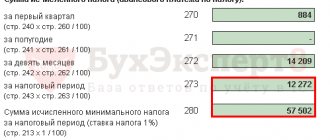The concept of local taxes and fees
Local authorities are also given limited powers by domestic legislation to establish local taxes and fees in the territory under their control.
The granting of such powers is due to the inability to fully ensure the interests of the basic municipal districts at the expense of the republican and regional budgets, which is why local taxation and the formation of the local budget are designed to ensure the local interests of the population and the territorial unit as a whole and to promote its development.
Local taxes and fees are mandatory payments that are established by the local authorities of the basic administrative-territorial unit within the limits of the rights and powers granted to such authorities by federal tax legislation and the Tax Code of the Russian Federation.
Like federal and regional, local taxes and fees are included in the taxation system of the Russian Federation.
The nature of such taxes and fees does not differ from other obligatory payments payable to the budgets of higher levels; they have a pronounced fiscal nature and are designed to provide financial expenses for the municipal budget.
The US is forcing Europe to betray the planet over Russian gas
“In the discourse of the Russian leadership, there has long been an idea that the country will be forced, figuratively speaking, to pay an additional tax in order to remain an independent player and not make political concessions to opponents,” political scientist Andrei Kortunov told the newspaper VZGLYAD. Earlier, Foreign Minister Sergei Lavrov called Western sanctions a “tax on independence.”
“Lavrov expressed in a laconic and vivid form an idea that has long been present in the Russian leadership. In fact, the choice comes down to maintaining sovereignty, but then remaining an object of economic pressure. Or somehow reduce the pressure, but at the expense of part of the sovereignty,” says Andrei Kortunov, director general of the Russian International Affairs Council and member of the Valdai discussion club.
Lavrov’s conversation with foreign journalists on Thursday is the first significant speech in which the new reality is analyzed, the political scientist believes. “The head of the Foreign Ministry is thinking about how our country can live and even develop in this reality, how to overcome attempts to drive it into international isolation and turn Russia into a rogue country. It cannot be said that the full program was presented, but this is an application for a new foreign policy strategy for Russia,” Kortunov added.
“It is already clear that the new reality will be tough. Confrontation will become more important than cooperation. The Ukrainian borders are not the last frontier over which Russia and the West will have to clash. Military-technical competition and geopolitical rivalry will continue. It is likely that methods of economic and information warfare will be used even more actively. It is very important for Russia to be more prepared for this new reality than its geopolitical opponents. It is very important to find the right balance between the various instruments of foreign policy, while maintaining its comprehensive strategic nature. Diplomats and experts are now required to re-evaluate their traditional approaches,” Kortunov concluded.
As the VZGLYAD newspaper reported, Foreign Minister Sergei Lavrov on Thursday gave interviews to Russian and foreign media on the current international agenda. In particular, he stated that the United States had subjugated Europe, as Napoleon and Hitler tried to do in their time. “It’s clear that NATO doesn’t even raise any questions, but the European Union has been shown its place,” he added. At the same time, in his opinion, the United States is seeking in the current conflict not to ensure the security of Ukraine based on a balance of interests of all countries, but to “demonize” Russia. “The goal was not to ensure the security of Ukraine based on a balance of interests of Ukraine, the United States and Russia, but the goal was to demonize and finish off the Russian Federation,” TASS quotes him.
Nevertheless, politically Moscow does not feel alone, Lavrov added. “I am sure that the world is listening to Russia. It’s hard for me to say how far they hear us. I think that the majority understands what we are talking about, but is forced to submit to the strictest dictates,” RIA Novosti quotes him as saying. According to the minister, Western sanctions have become a kind of tax on independence.
Watch even more videos on the VZGLYAD YouTube channel
System of local taxes and fees
The system of local taxes and fees is also provided for by the Tax Code of the Russian Federation and is represented by an exhaustive list of both taxes and fees. State power represented by local government cannot go beyond this list and establish additional fees or local taxes.
Local taxes are presented in the form of taxes:
- federal;
- regional;
- local, put into effect by the self-government body within the municipality.
Local fees include:
- Federal level;
- local level.
Within the region, the introduction of fees is not provided for by the Tax Code of the Russian Federation, and accordingly is unacceptable, which is why the system of fees throughout the country is represented by two levels.
We will recalculate and minimize tax deductions
Sign up for a consultation with a specialist
+7
Types of local taxes and fees
Local taxes include the following:
1. Land tax. The Russian tax system provided for the introduction of this tax in order to stimulate the rational use of land with all the ensuing consequences, as well as for the development of local infrastructure. The regulatory framework consists of two levels:
- federal laws;
- acts issued by local representative bodies.
Cities of federal significance, which include Moscow and St. Petersburg, have their own characteristics, but they relate more to the procedure for introducing the specified tax.
When establishing a land tax, the authority by whose decision it is introduced also determines:
- tax rates;
- payment procedure;
- payment terms.
If necessary, they may also provide for in the same laws:
- tax benefits;
- grounds for providing benefits;
- procedure for providing benefits;
- the amount of money that is not subject to taxation for certain categories of taxpayers.
Taxpayers of land tax are:
- legal entities - organizations;
- individuals.
An important criterion for classifying them as taxpayers is the presence of a land plot that they own with one of the following rights:
- property;
- use on an ongoing basis;
- lifelong ownership, transferred by inheritance.
Individuals and legal entities using plots of land in accordance with a lease agreement or under the right of free-term use are excluded from the number of taxpayers of such tax.
The object of payment of land tax is a piece of land that is territorially related to the municipality where the local government authorities have introduced such a tax. An exception to this rule are plots of land that:
- according to the legislation of the Russian Federation were withdrawn from circulation;
- According to the legislation of the Russian Federation, circulation was limited.
2. Tax on property of individuals.
The subjects of property tax payment are citizens (not only Russian ones) who are the owners of property that is subject to tax in accordance with federal law. Such property includes:
- residential building, apartment or room;
- country house;
- garage;
- other buildings, structures and premises, as well as shares in the ownership of the above property.
The calculation of the tax amount depends on the tax base, which is annually as of 01.01. calculated in accordance with the total investment cost.
Local taxes include only trade fees. However, the effect of the right to establish local self-government is territorially limited. Such a fee can be introduced only on the territory of several administrative-territorial units, namely:
- Moscow;
- Saint Petersburg;
- Sevastopol.
Article 15 of the Tax Code of the Russian Federation. Local taxes and fees (current version)
The commented article establishes a list of local taxes, as well as a local tax - trade tax.
In the Russian Federation, two local taxes are established: land tax, regulated by Chapter 31 of the Tax Code of the Russian Federation, and tax on property of individuals, regulated by Chapter 32 of the Tax Code of the Russian Federation.
In accordance with Part 4 of Article 4 of the Federal Law of November 29, 2014 N 382-FZ, a trade tax can be introduced in three cities: Moscow, St. Petersburg and Sevastopol - after 07/01/2015. In municipalities located outside the territory of these cities, a trade tax can be introduced only after the adoption of the corresponding federal law.
When introducing a trade tax, its rate is established within the limits indicated in Chapter 33 of the Tax Code of the Russian Federation, and benefits, grounds and procedures for their application can also be established.
Other mandatory elements of the trade tax are regulated directly by Chapter 33 of the Tax Code of the Russian Federation.
Currently, the trade tax has been introduced only in the city of Moscow, in whose territory it has been in effect since July 1, 2015 (Moscow City Law of December 17, 2014 N 62 “On Trade Tax”).
In a letter from the Department of Economic Policy and Development of Moscow dated June 26, 2015 N DPR-20-2/1-161/15, it is explained that a trade tax is a fixed mandatory payment that is levied on a specific trade item. In this case, the paid trade fee can be deducted directly from the amount of income tax, single tax under the simplified taxation system (if the object of taxation is income) or personal income tax. Thus, paying a trade tax will not lead to an increase in the tax burden for most conscientious taxpayers.
Thus, for individual entrepreneurs, paragraph 5 of Article 225 of the Tax Code of the Russian Federation provides that the taxpayer has the right to reduce the amount of tax calculated at the end of the tax period at a rate of 13 percent by the amount of the trade tax paid in this tax period.
For organizations, paragraph 10 of Article 286 of the Tax Code of the Russian Federation provides that the taxpayer has the right to reduce the amount of tax (advance payment) calculated based on the results of the tax (reporting) period, credited to the consolidated budget of the subject of the Russian Federation, which includes a municipal entity (to the budget of cities of federal significance Moscow, St. Petersburg or Sevastopol), in which the specified fee is established, in the amount of the trade tax actually paid from the beginning of the tax period until the date of payment of the tax (advance payment).
These rules do not apply if individual entrepreneurs and organizations fail to provide notice of registration as a payer of the trade tax in relation to the object of business activity for which the trade fee has been paid.
It should be taken into account that, as explained in the letter of the Department of Economic Policy and Development of Moscow dated June 26, 2015 N DPR-20-2/1-161/15, it is unlawful to deduct the trade tax from the entire amount of income tax. The taxpayer has the right to reduce the amount of tax (advance payment) calculated based on the results of the tax (reporting) period, credited to the consolidated budget of the constituent entity of the Russian Federation. This means that the trade tax can only be offset against the regional portion of the income tax.
Comment source:
“ARTICLE-BY-ARTICLE COMMENTARY TO PART ONE OF THE TAX CODE OF THE RUSSIAN FEDERATION” (UPDATE)
Yu.M. Lermontov, 2016
Principles of local taxes and fees
Local taxes and fees exist and operate according to the general principles of the entire tax system of the country. These include the following principles:
1. The principle of justice. When introducing a particular tax, the existence of an objective opportunity for the target group of taxpayers to pay the tax (fee) must be taken into account;
2. The principle of universality and equality of taxation. The obligation to make payments to the budget, if there are legal grounds, lies with an indefinite circle of persons who are equal in their rights and responsibilities. It is not permissible to unjustifiably exempt some payers from paying a tax (fee) and simultaneously collect it from others under the same conditions.
3. The principle of economic feasibility. The establishment of taxes cannot be spontaneous and arbitrary, but must be justified from an economic point of view. Their introduction should not infringe on the rights and freedoms of citizens provided for by the Constitution of the Russian Federation.
4. The principle of unity of the economic space of the Russian Federation. Taxes (fees) that in any way encroach on the integrity of the country’s economic space are unacceptable. Mandatory payments to the budget cannot directly or indirectly affect the freedom of movement within the country, both goods (works, services) and financial resources. Any obstacle to legally permitted business activities by introducing mandatory payments is prohibited.
5. The principle of compliance with the procedure for establishing a tax (fee). Taxes (fees) that are not provided for in the Tax Code of the Russian Federation or are introduced in violation of the procedure are not subject to payment.
6. Certainty of tax liability. By regulation, when the obligation to pay to the budget is introduced, all elements of taxation must be fixed. The wording of tax legal norms must be clear so that the taxpayer clearly knows for what, how much, and when the corresponding tax is required to be paid to the budget.
7. Presumption of interpretation of tax doubts in favor of the taxpayer. If there are vague formulations and doubts about tax rules, their interpretation is carried out in favor of the taxpayer.
Registration
In general, changes in the cadastral value of a land plot during a tax period are not taken into account when determining the tax base in this and previous tax periods (clause 1 of Article 391 of the Tax Code of the Russian Federation). That is, you need to pay tax from the new tax base only from the next tax period, with the exception of two cases:
- when correcting a technical error made by Rosreestr when maintaining the state real estate cadastre;
- when the cadastral (register) value of an object changes based on a decision of the commission for resolving disputes on the results of determining the cadastral value or by a court decision (clause 1 of Article 391 of the Tax Code of the Russian Federation).
A technical error (a clerical error, a typo, a grammatical or arithmetic error, or a similar error) is an error made by the cadastral registration authority when carrying out state cadastral registration and (or) state registration of rights, leading to a discrepancy between the information contained in the Unified State Register of Real Estate and the information in the documents on on the basis of which information was entered into the Unified State Register.
Cadastral (registry error) is an error reproduced in the Unified State Register of Real Estate in the boundary plan, technical plan, map plan of the territory or survey report, which arose as a result of an error made by the person who performed the cadastral work, or an error contained in documents sent or submitted to the registration authority rights by other persons and (or) bodies in the order of information interaction, as well as in other established procedures (Parts 1, 3 of Article 61 of the Federal Law of July 13, 2015 No. 218-FZ “On State Registration of Real Estate”).
A change in the cadastral value of a land plot due to the correction of a technical error made by Rosreestr is taken into account when determining the tax base, starting from the tax period in which the erroneously determined cadastral value was applied.
The cadastral value of a land plot can be changed by decision of a special commission or by a court decision.
Such changes entail a recalculation of the tax calculated based on the cadastral value.
From August 11, 2022, changes introduced by Federal Law No. 269-FZ of July 31, 2022 are in effect.
A rule has been established on the retrospective application of the cadastral value of a property in taxation. If the correction of an error made in determining the cadastral value led to its decrease, then the new value will be extended to the entire period from the date the information on the cadastral value began to be applied.
If the cadastral value increases, its new value will be applied starting next year.
And if there are several cadastral values applied at one point in time, determined for one date, the lowest of them is applied - according to the law on valuation activities.
If the cadastral value is determined in the amount of its market valuation, it should be applied “retroactively” - from January 1 of the year in which the application was submitted and a positive decision was made (but not earlier than the date of registration of the object in the cadastre).
From January 1, 2022, an application to correct errors made in determining the cadastral value can be submitted within 5 years from the date of entering information about the cadastral value into the Unified State Register of Real Estate.
From January 2022, two cases have been established when land tax needs to be recalculated due to adjustments to the cadastral value.
- The cadastral value of an object changes due to the fact that its market value is established. The tax is recalculated retroactively for all periods during which the variable cadastral value was applied (clause 1.1 of Article 391 of the Tax Code of the Russian Federation).
- The cadastral value changes due to changes in the characteristics of the object. The calculation algorithm is as follows (clause 7.1 of Article 396 of the Tax Code of the Russian Federation):
- for the period from January 1 to the date of change, the tax amount is calculated based on the previous cadastral value, taking into account the coefficient. It is equal to the number of full months that have passed from January 1 to the specified date, divided by the number of calendar months in the tax period. If the change occurred after the 15th day, the current month is considered a full month;
- for the period from the date of change to December 31, the tax amount is calculated based on the changed cadastral value taking into account the coefficient. It is equal to the number of full months that have passed from the specified date to the end of the tax period, divided by the number of calendar months in the tax period. If the change occurs on or before the 15th, the current month is counted as a full month.
Let us remind you: if you own the land for less than a year (for example, several months), then the tax is paid only for these months. Calculate land tax for several months taking into account the ownership coefficient using the formula:
| Amount of land tax for less than a year | = | The tax base | x | Tax rate | x | Number of months during which the plot was registered to the owner / 12 months |
Features of local taxes and fees
Despite the similarity of local taxes and fees with the general characteristics of the entire Russian tax system, local taxes and fees have their own distinctive features:
- funds received by the relevant local budget are subject to spending exclusively on the needs of the municipality itself;
- local withholding taxes are accumulated in the local budget; higher budgets at the regional or federation level are distributed in certain proportions between all three levels, including the local one.
- the decision to introduce and collect appropriate fees lies solely with local authorities;
- control over the use of local budget funds is also carried out locally by self-government bodies.
- a wide range of powers for the legal regulation of local taxation, which includes the ability to reduce tax rates and establish benefits and privileges for certain categories of tax payers.
The procedure for establishing local taxes and fees
The enactment and cancellation of a particular local tax (fee) is carried out according to the rules prescribed by the domestic tax code, on the basis of legislative decisions of bodies performing representative functions at the basic level. This competence of local authorities is enshrined in Article 39 of the federal law “On the General Principles of the Organization of Local Self-Government.” According to this norm, local authorities have the right to establish (cancel):
- local taxes (fees);
- preferential conditions for local taxation for certain categories of payers.
In addition, one-time contributions of funds to the local budget by citizens living in a certain territory on a voluntary basis may be provided.
Voluntariness consists of citizens expressing their will at a local referendum, meeting, etc.
Collection of land and property taxes is also carried out after the relevant decision is made at the local level. Moreover, such a decision should not contradict the federal tax code.



